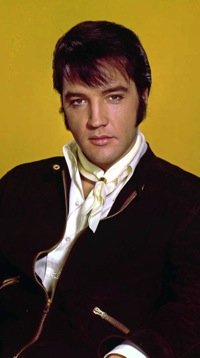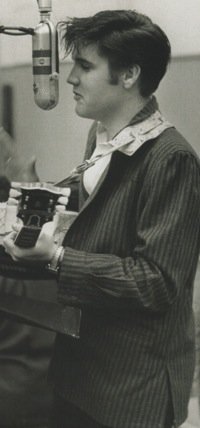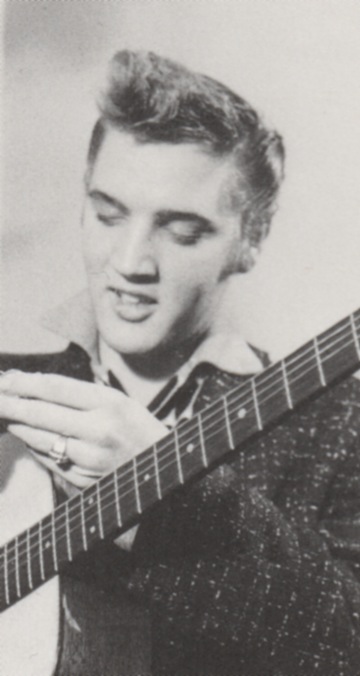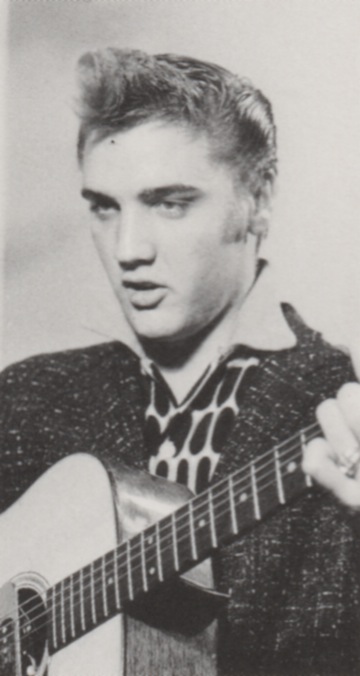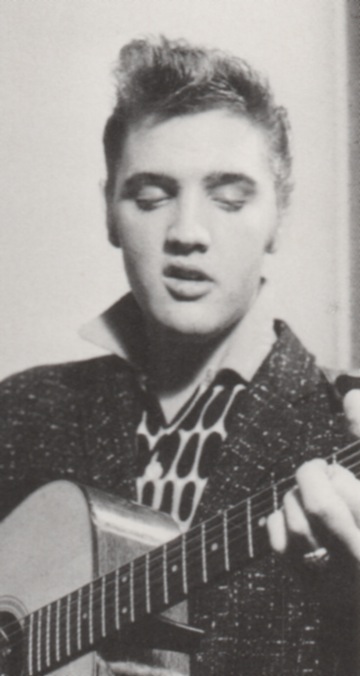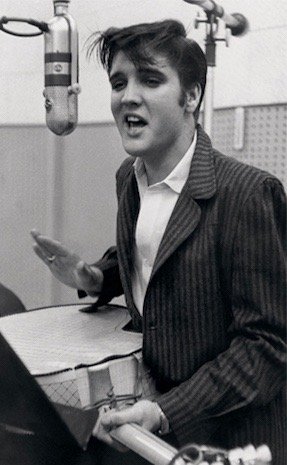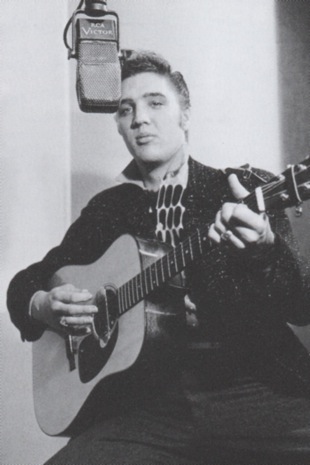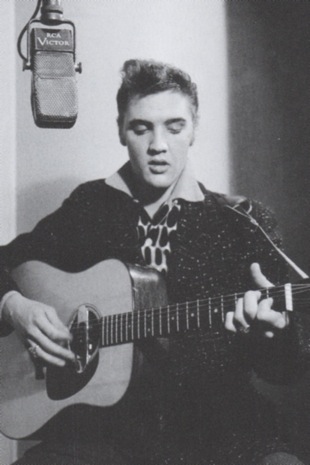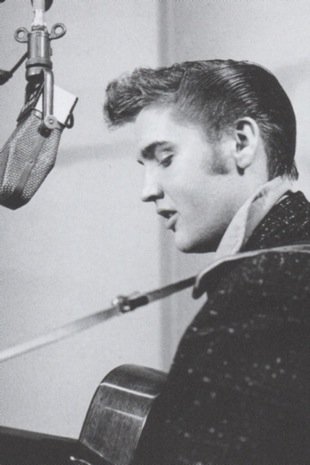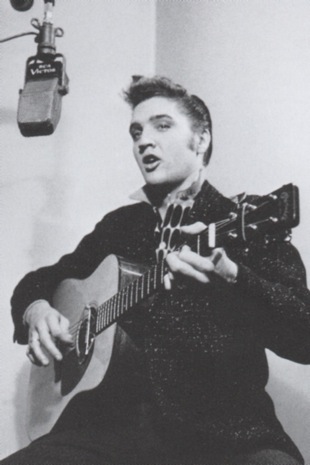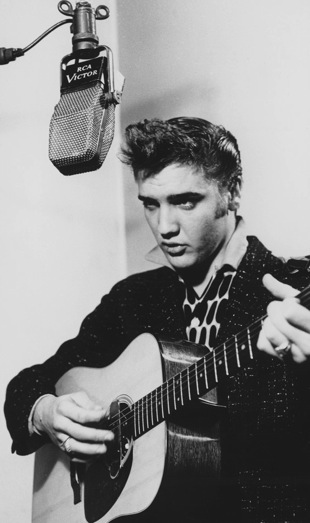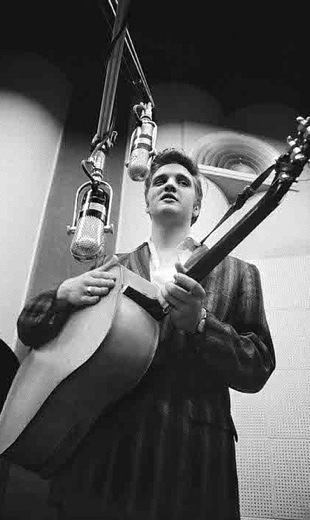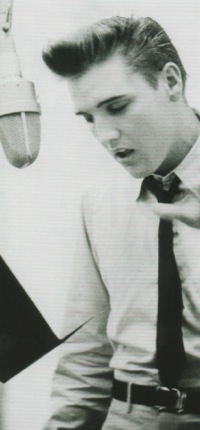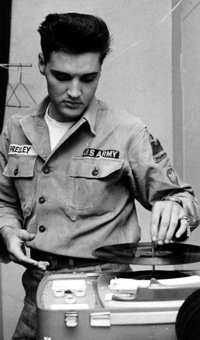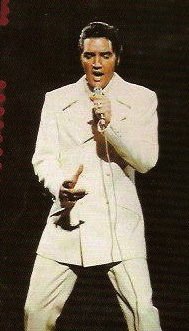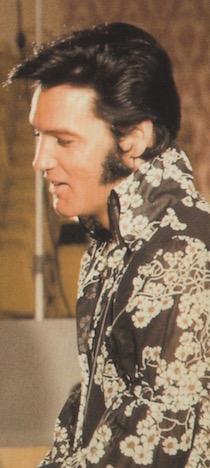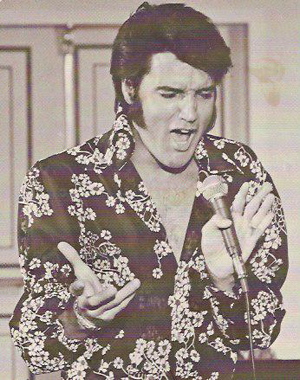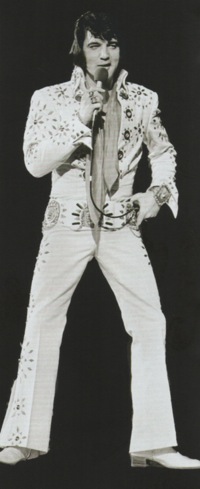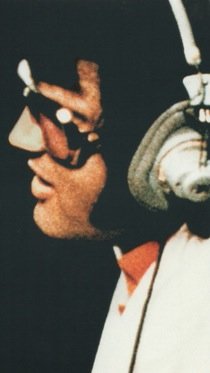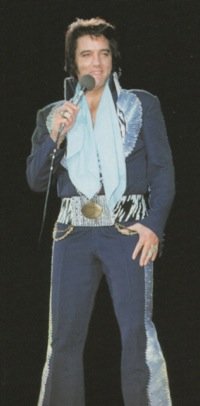Elvis History Blog
Elvis or The Beatles …
Who Was the Real "King of the Charts”?
Recently, I received an email from an Elvis fan who expressed his concern about what he perceived as a growing bias in the music industry media.
“I think that present day there is a changing of sorts with regards to Elvis and The Beatles,” he contended. “My thoughts on the matter are that those now in charge of Rolling Stone and other media related groups are from The Beatles’ generation. (Elvis’ generation, so to speak, has left the building.) For example, Billboard ignoring Elvis’ chart records from ’56 to ’58 so they could celebrate their 50th anniversary is an example. Wiping away these two years put Elvis at #4 on that list and moved The Beatles to #1. Conversely, if The Beatles first two years of statistics were taken away from them, they would have placed lower that #4, and probably out of the top 10. This upswing towards The Beatles to #1 in opinion polls and Elvis moving to #2 (or, in the case of Rolling Stone, #3 behind Bob Dylan) is directly related to this transition.”
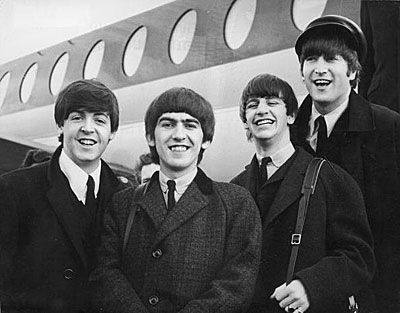
My comments on Rolling Stone’s 2008 “100 Greatest Singers of All Time” ratings appears elsewhere on this site. Here, though, we’ll examine for bias Billboard’s commemorative “Hot 100” issue from August 2008.
The Billboard “Hot 100” chart has long been accepted as the music industry standard for ranking current and past single recordings. The magazine launched that chart in its August 4, 1958, edition, and in its tribute issue to the anniversary of the “Hot 100,” Billboard’s think tank came up with a list of the 100 “All-time Top Artists” on the “Hot 100.”
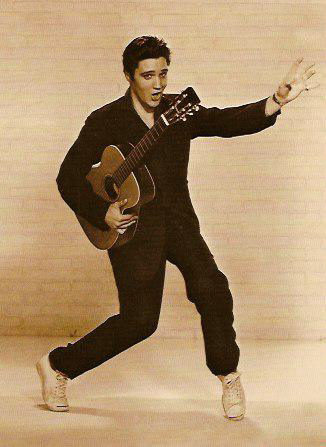
The Beatles topped the list, followed in order by (2) Madonna, (3) Elton John, (4) Elvis Presley, (5) Stevie Wonder, (6) Mariah Carey, (7) Janet Jackson, (8) Michael Jackson, (9) Whitney Houston, and (10) The Rolling Stones.
On the surface, a few of those placings are counter-intuitive (Janet ahead of Michael?), but for now let’s just consider how The Beatles finished so far ahead of Elvis on the list. The answer is simple enough. Since the rankings include only entries in the “Hot 100,” they ignore all of Presley’s hit single records before August 4, 1958. That means 30 Elvis chart records, including 13 top 10 sides and 7 #1 songs were not counted in the Billboard list that placed Elvis well behind The Beatles.
• Let’s be fair—count the “Top 100”
While I have never taken the Elvis vs. Beatles competition too seriously, I know that many long time fans of both do. And a fair, head-to-head assessment of the music chart history of both acts is easy to compile.
The origins of the “Hot 100” go back to November 1955, when Billboard launched its “Top 100” chart. Elvis’s first hit single, “Heartbreak Hotel,” made its debut on the “Top 100” in March 1956. He went on to dominate that chart until Billboard replaced it with the “Hot 100” in August 1958. In reality, the magazine simply jazzed up the name of its main singles chart by changing its title to the “Hot 100.” A comparison of the final “Top 100” chart on July 28, 1958, and the first “Hot 100” chart the following week indicates that there was no substantive change in how the two charts were compiled. The ratings continued to be based basically on a mixture of commercial sales and disc jockey airplay reports.
So, simply recognizing the continuous flow from Billboard’s “Top 100” into its “Hot 100” allows a direct comparison of Elvis Presley’s and The Beatles’ chart history. Let’s call that combined chart the “Top/Hot 100.”
• Elvis and The Beatles: a raw number comparison
One disclaimer before we start looking at the chart history of Elvis and The Beatles. Not counted in the comparison below are the few records that each had in the “Top/Hot 100” after their careers ended; that is, after Elvis’ death in 1977 and after The Beatles broke up in 1970. And, of course, The Beatles are not given credit for the chart records of each former Beatle after the breakup.
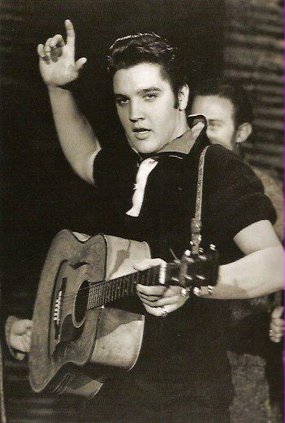
Now let’s take a look at the raw Billboard chart numbers, starting with the total of recordings by the two acts on the “Top/Hot 100” during their respective careers. Then we’ll break it down into top 40, top 20, top 10, top 5, and #1 records for each.
In total chart songs, Elvis more than doubled up on The Beatles. Between 1956 and 1977, Presley put 134 sides in the “Top/Hot 100” charts. That’s an average of a little over 6 chart titles per year over 22 years. His first chart record, “Heartbreak Hotel,” entered the chart on March 3, 1956. His final entry on the Billboard singles chart came when “Way Down” debuted on June 25, 1977. It was still on the chart when Elvis died less than two months later.
During their career as a group, The Beatles placed a total of 62 titles on the “Hot 100” between 1964 and 1970. They debuted with “I Want to Hold Your Hand” on January 18, 1964, and made their final bow with “The Long and Winding Road,” which last appeared on the Billboard chart on July 25, 1970. Although The Beatles’ total chart records can’t compete with Elvis’ total, the group’s average per year is much higher. They averaged nearly 9 singles chart entries per year over their 7 years as a group.
• Beatles lead Elvis in #1 records
Now let’s take a look at the individual performance of each performer’s “Top/Hot 100” records. As to be expected, due to his far greater number of total chart entries, Elvis has the advantage over The Beatles in most performance categories. Presley placed 102 titles in Billboard’s top 40, while The Beatles had 50 entries that made it that far up the chart. In the top 20, Elvis had 61 songs and The Beatles 37. Near the top of the chart, however, the Fab Four closed the gap and overtook Elvis. Presley still had more in the top 10 (38 to 31) and the top 5 (32 to 29), but at the coveted #1 position, The Beatles dominated Elvis with 20 chart-toppers to Presley’s 14.
For the record, The Beatles’ #1 records on the “Top/Hot 100” were “I Want to Hold Your Hand” (1964), “She Loves You” (1964), “Can’t Buy Me Love” (1964), “Love Me Do” (1964), “A Hard Day’s Night” (1964), “I Feel Fine” (1964), “Eight Days a Week” (1965), “Ticket to Ride” (1965), “Help!” (1965), “Yesterday” (1965), “We Can Work It Out” (1966), “Paperback Writer” (1966), “Penny Lane” (1967), “All You Need Is Love” (1967), “Hello Goodbye” (1967), “Hey Jude” (1968), “Get Back” (1969), “Something”/“Come Together” (1969), “Let It Be” (1970), and “The Long and Winding Road” (1970).
Elvis’ 14 chart-toppers were “Heartbreak Hotel” (1956), “Don’t Be Cruel” (1956), “Love Me Tender (1956), “All Shook Up” (1957), “Teddy Bear” (1957), “Jailhouse Rock” (1957), “Don’t” (1958), “A Big Hunk O’Love” (1959), “Stuck on You” (1960), “It’s Now or Never” (1960), “Are You Lonesome Tonight?” (1960), “Surrender” (1961), “Good Luck Charm” (1962), and “Suspicious Minds” (1969).
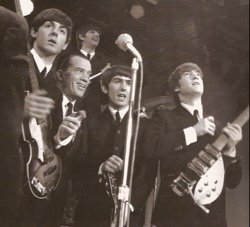
In an interesting turnabout, however, Elvis actually spent more weeks atop Billboard singles chart than The Beatles, even though he had 6 fewer titles reach the top spot. Elvis’ 14 chart-toppers spent a combined total of 62 weeks at #1 on the “Top/Hot 100,” while The Beatles’ 20 #1s spent a total of 59 weeks in the top slot. In The Beatles defense, for whatever reason, single records in the late 1950s, when Elvis was at his chart peak, tended to stay atop the Billboard chart for a longer period of time than in the mid-sixties, when The Beatles dominated the chart. For example, in 1956-1957, only 25 single records reached #1 on the “Top 100,” while in 1964-1965, a total of 48 titles topped the “Hot 100.”
• Points system is another way to compare
Another way of assessing the relative career chart performance of Elvis and The Beatles is to use a points system. For instance, one method would be to assign from 1 to 100 points to each chart record based on the highest chart position it reached. A single that reached #1, such as “Jailhouse Rock” for Elvis and “I Feel Fine” for The Beatles, would be awarded 100 points. Sides that peaked at #2, such as Elvis’ “Can’t Help Falling in Love” and The Beatles’ “Yellow Submarine,” would earn 99 points. As songs peaked further down the chart, fewer points would be assigned. A record that barely made it into the “Top/Hot 100” at #100, but rose no higher, would receive just 1 point.
Under that points system, all of Elvis’ chart records between 1956-1977 earn 9,844 points. The Beatles’ point total for their chart output from 1964-1970 comes to 4,716, a little under half of Presley’s total. Again, the length of Elvis’scareer would seem to give him an unfair advantage over The Beatles in that comparison. But that turns out not to be the case, since the average highest position reached by Presley’s 134 “Top/Hot 100” entries was #27, while The Beatles’ 62 chart sides averaged a high water mark of #36. The Beatles may have had six more #1 records than Elvis, but Presley more than made up for that deficit in the point system by having more #2s (7 to 3) and #3s (5 to 2) than The Beatles.
Again, for the record, The Beatles three #2 records were “Do You Want to Know a Secret” (1964), “Twist and Shout” (1964), and “Yellow Submarine” (1966). Elvis’ seven runner-up singles were “Hound Dog” (1956), “Too Much” (1957), “Hard Headed Woman” (1958), “A Fool Such As I” (1959), “Can’t Help Falling in Love” (1961), “Return to Sender” (1962), and “Burning Love” (1972).
Beatles #3s were “Please Please Me” (1964) and “Nowhere Man” (1966). Peaking at #3 for Elvis were “I Want You, I Need You, I Love You” (1956), “Wear My Ring Around Your Neck” (1958), “Devil in Disguise” (1963), “Crying in the Chapel” (1965), and “In the Ghetto” (1969).
• Elvis tops Beatles in career chart totals
In “Career Chart Totals,” then, Elvis Presley tops The Beatles in nearly every category. Only in the #1 records sub-category can the Fab Four claim an advantage over the King of Rock ’n’ roll. Of course, Beatle fans will contend that comparing the group’s career chart totals with those of Elvis is clearly unfair. After all, Presley had 22 years in which to accumulate his totals, while The Beatles had less than 7 years.
Beatle advocates might ask for a “head-to-head” comparison. After all, the careers of the two iconic acts did overlap. Fair enough. Let’s compare, then, the chart performance of Elvis and The Beatles from January 18, 1964, through July 25, 1970, when both were putting platters in the “Hot 100.”
Keep in mind that this period coincides with the entire chart career of The Beatles. So their Billboard chart totals in this comparison are the same as their career totals—62 chart titles, 50 in the top 40, 37 in the top 20, 31 in the top 10, 29 in the top 5, and 20 #1s. Conversely, all of Elvis’ chart records before January 1964 and after July 1970 won’t count in this comparison.
The first chart record Elvis had during this head-to-head match up with The Beatles was “Kissin’ Cousins.” In February 1964, when that title tune from one of Presley’s movies debuted on the “Hot 100,” The Beatles already held down the top two spots on the chart (“I Want to Hold Your Hand” and “She Loves You”). That’s an indication of how poorly for Elvis this comparison with the Fab Four is going to go. Led by The Beatles, the “British Invasion” of the American charts in the sixties suppressed Presley’s records, along with those of many other American singers, on the singles charts. What little chart success Elvis had during this period came mostly during a brief career resurgence in 1969, which produced “Suspicious Minds,” his only #1 record during the era of Beatle dominance.
Head-to-head, then, from 1964-1970, The Beatles had more chart records (62 to 46), more in the top 40 (50 to 29), more in the top 20 (37 to 16), more in the top 10 (31 to 6), more in the top 5 (29 to 4), and a whopping 20 to 1 advantage in #1 singles. Beatle titles racked up 533 weeks on the “Hot 100” compared to Elvis’ 345 weeks during the same period. Using a system which assigns points to each chart record based on its highest position on the “Hot 100,” The Beatles’ 62 chart titles accumulated 4,012 points compared to just 2,846 points for Elvis.
The Beatles, then, clearly win the chart “head-to-head” competition with Elvis. But as the Beatle faithful might protest that Elvis’ advantage in “total career chart performance” was unfair to their boys, so could Presley fans claim the same of the “head-to-head” comparison. Longevity is the key to Billiboard chart supremacy, they might contend, pointing out that Elvis worked the “Top/Hot 100” for 22 years, while The Beatles were mere “flashes in the pan” for a mere 7 years.
Let me then propose a different method of comparing the chart performance of Elvis and The Beatles that would be fair to both sides. It’s called the “6-6-1” comparison.
• The “6-6-1” Comparison
The Beatles’ first placed a record on the “Hot 100” on January 18, 1964, (“I Want to Hold Your Hand”) and last appeared on that chart on July 25, 1970 (“The Long and Winding Road”). That’s a time span of 6 years, 6 months, and 1 week. I suggest, then, taking the first 6 years, 6 months, and 1 week of Elvis Presley’s chart history and putting it up against The Beatles’ chart run of the same length. Such a comparison would eliminate Elvis’ longevity advantage as well as The Beatles’ head-to-head advantage.
The first 6 years, 6 months, and 1 week of Presley’s career started on February 22, 1956, when “Heartbreak Hotel” first made the “Top 100,” and ended on August 29, 1962, when “She’s Not You” was Elvis’ current hit. So let’s compare Presley’s chart performance during that time span with the totals accumulated by The Beatles over the same amount of time, beginning in January 1964. The winner will be proclaimed “The Real King of the Charts.”
We’ll start with total singles charted during the first 6-year, 6-month, 1-week period of each act’s career. The Beatles have the edge in this category. They put 62 titles in the “Hot 100” between 1964-1970, while Elvis charted 57 sides between 1956-1962. It’s a push, though, when it comes to records in the top 40 of Billboard’s singles chart. Both had 50 entries in that part of the “Top/Hot 100.” Moving up the chart, The Beatles hold a slight advantage over Elvis in all other categories: top 20 (37 to 34), top 10 (31 to 29), top 5 (29 to 25), and #1s (20 to 13).
Although the “6-6-1” comparison seems to be a near sweep for The Beatles, it’s not quite that simple. In the first 6 ½ years of his chart history, Elvis’ 57 tunes spent a total of 684 weeks on the “Top 100,” easily exceeding the 533 weeks The Beatles accumulated with their 62 chart songs. And in the points system based on highest chart position of each record, Elvis wins again with 4,855 points to 4,716 for The Beatles.
So, the “6-6-1” comparison doesn’t produce a clear-cut winner. The Beatles can claim more chart records and more titles reaching higher levels on the chart, while Presley has more weeks and longevity on the chart on his side. The title of “The Real King of the Charts,” then, is still up for grabs. Let’s move on to a couple of tiebreakers to see if we can finally determine a winner.
• The “Best Single Chart” Comparison
The “Top/Hot 100” chart has been published weekly in Billboard since 1955. Between Elvis and The Beatles, which one had the most dominant single weekly chart during their recording careers?
We’ll start with Presley. His most dominant chart appeared the week of November 17, 1956, when he had 7 titles in the “Top 100.” “Love Me Tender” led the way that week at #1, followed by “Don’t Be Cruel” at #4, “Hound Dog” at #19, “Anyway You Want Me” at #33, “I Don’t Care If the Sun Don’t Shine” at #82, “Love Me” at #84, and “Blue Moon” at #92.
As impressive as that performance was, however, it can’t come near to matching what The Beatles did on the “Hot 100” the week of April 4, 1964. On that week’s chart, The Beatles held the top 5 spots: #1 “Can’t Buy Me Love,” #2 “Twist and Shout,” #3 “She Loves You,” #4 “I Want to Hold Your Hand,” and #5 “Please Please Me.” In addition, the Fab Four had 7 other sides on the chart that week, giving them an incredible 12 titles on Billboard’s singles chart during the same week. That puts The Beatles one up on Elvis going into the last tiebreaker.
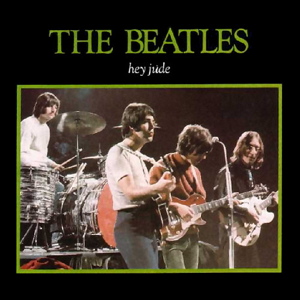
• The “Biggest Hit” Comparison
Now let’s see who, Elvis or The Beatles, had the single biggest hit single on the “Top/Hot 100.” This time we’ll start with the Fab Four. Their biggest hit single was “Hey Jude,” which entered the “Hot 100” at #10 on September 14, 1968. It jumped to #3 the following week, and then settled in at #1 for 9 consecutive weeks between September 28 and November 23. It stayed on the chart through December 18, when it finished up its run of 19 weeks on the “Hot 100.” Billboard rated “Hey Jude” the #1 “Hot 100” song of 1968 and #8 on its list of top overall “Hot 100” singles in its 50th anniversary rankings.
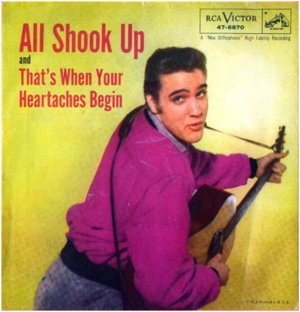
It was an impressive accomplishment for The Beatles, but one that paled in comparison to Elvis Presley’s biggest single record. “All Shook Up” debuted on the “Top 100” at #26 on April 6, 1957. It climbed to #6 a week later and then, on only its third week on the chart, reached #1 on April 20. There it stayed for 8 weeks, until it dropped to #2 on June 10. It placed in the chart’s top 10 for an incredible 15 weeks and remained in the “Top 100” for 30 weeks. Think about it—“All Shook Up” rode Billboard’s singles chart for 7 months in 1957! It was easily the biggest pop single of that year, but since it appeared on the “Top 100” a year before the chart’s name changed to the “Hot 100,” it was ignored in Billboard’s anniversary ratings.
So The Beatles had the best single chart performance, but Elvis had the single biggest hit record. Even these two tiebreakers have failed to determine which of the two is “The Real King of the Charts.” The inescapable conclusion is that both Elvis Presley and The Beatles can lay claim to that title. It all depends on how one chooses to spin and prioritize the impressive chart numbers that both put up.
In the end, though, the Billboard singles chart performance of both Elvis Presley and The Beatles is just one argument in a much larger debate—which one had the greatest ongoing influence on American pop culture in the latter half of the twentieth century?
The writer of the email message referenced above offered his view of the debate’s scope and declared a winner—for now. “The debate between the two in rock is a valid one,” he allowed. “However, when taking a broader perspective of hits, country, rock, r&b, gospel, easy listening, coupled with other influences such as movies, TV, social impact, the debate is less and Elvis is the clear front runner. It will be interesting to see in the years to come if he can retain this status.” — Alan Hanson | © August 2011
Reader Comment: Regarding your Elvis vs. Beatles debate... Not only did it take Elvis 3 decades to do what the Beatles did in 6 years but the competition was also a LOT heavier by the time the Beatles came around. Let's face it, when Elvis started out there weren't but a few other white singers who didn't suck. And blacks couldn't get airplay. Elvis took R&B songs and gave them a white face. The Beatles redefined music several times. NO question who was better! — Marq (October 2014)
Reader Comment: One has to remember and take into account when Elvis arrived Rock ’n’ Roll was new. He was frowned upon by the establishment. TV was relatively new, and the teenagers of the fifties had less disposable income than the teenagers of the sixties. Most importantly the world’s population was much smaller during the fifties than during the Beatles time of the sixties. Elvis created the circumstances for the Beatles to be accepted immediately by both adults and teenagers unlike himself. Therefore, it’s too hard to say who was greater. Of course the Beatles sold more, faster. They had a far bigger and wealthier market to sell to. Singles were the norm during Elvis’ reign, while albums were the norm during the Beatles reign. How can anyone honestly compare? Simply impossible. They both changed the world in their own ways. In my opinion, they’re both equal. They are the epitome of music during the twentieth century. — Steve (July 2018)
Reader Comment: Shouldn't you also take into account the fact that the Beatles wrote almost all of their work? Music and lyrics. — David (June 2023)
Reader Comment: The Beatles kept big hits on their albums and did not release them as singles. If the had chosen to release singles from i.e Sgt. Pepper or The White Album they would have generated a lot more number 1's. — Morten (November 2023)
Go to Elvis Music
Go to Home Page
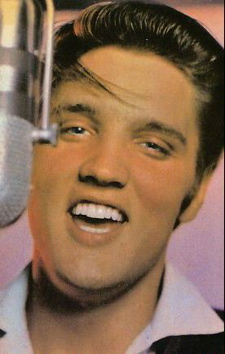
"The Billboard singles chart performance of both Elvis Presley and The Beatles is just one argument in a much larger debate—which one had the greatest ongoing influence on American pop culture?"
